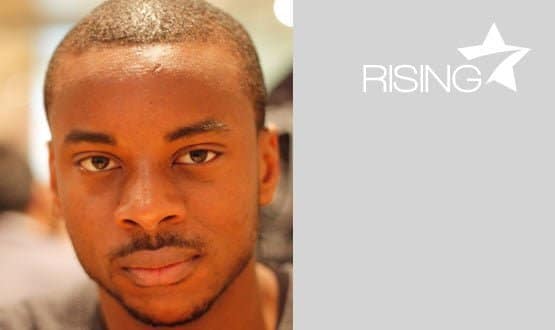Rising star: Elijah Charles
- 8 October 2013

Elijah Charles’ official title is ‘integration technical consultant’. But he describes his job as a “pseudo trouble shooter/consultant/MacGyver-type role.”
MacGyver, for non-fans, was a US series revolving around Angus MacGyver, a secret agent working for the Phoenix Foundation and the US government.
Every episode, he would solve seemingly impossible problems using only his trusty Swiss Army Knife and common household objects. Charles reaches instead for computer code and data analytics.
But the point applies; at Kings College Hospital NHS Foundation Trust he orchestrates a plethora of projects, and is the go-to guy when there is a problem with interoperability.
Growing up just down the road
Charles grew up in Brixton, where he spent hours at the local library; not necessarily to read the books, but to use the shiny, new computer.
“I used to dream up the code at home, go to the library, put it into the computer, hope it would work, and get really excited when it did,” he says. So ending up in IT was not a big surprise. As Charles says himself: “I’ve always been an IT person.”
The NHS however, was a much less certain destination. “I’ve always been interested in IT but maybe not so much in health care,” he says.
However, after doing work experience at King’s, which is conveniently located about a mile from where Charles grew up, he realised that there were “interesting IT issues in the NHS.”
The job at the trust was his first after graduating, and after a two year stint working in the finance industry, he found his way back to healthcare. “The NHS is pretty much my first job after school, and I’ve stayed here ever since,” he says.
Tying up integration
Over the last decade, Charles has become an all-rounder in the IT department although, recently, he has found himself focusing on integration issues.
“Most recently, we’ve been working on getting the integration engine working,” he says, referring to an open source integration engine the trust has developed in collaboration with Tactix4.
Charles has been the technical lead on the project, which has proved a lot of hard work. The trust wanted a platform that was capable of a high level of integration, but that did not lock it into a particular vendor.
After 110 endpoint migrations and many late evenings, Charles could finally breathe, as the trust went live with its Apache Service Mix open source integration engine.
Getting to grips with genome research
By way of something completely different, he has also been working on a big genomics project. King’s runs two separate laboratories that cover all aspects of genomics research.
Their lab technicians sometimes need help from IT, as algorithms and datasets are not always their area of expertise. The data sets pose no problems for Charles, but he’s not an expert on genomes.
Therefore, he has been collaborating with his lab colleagues on a project that could see them using genome sequencing for diagnoses in around two years’ time.
The project has seen him spending hours with his nose in an encyclopaedia. “I always come at any project from an IT point of view,” he says. “I have to try really hard sometimes to understand the business. The genome work I had to go off and read about it in my own time.”
The possibilities of big data
What Charles is most excited about, though, is ‘big data’. The project he is working on at the moment involves building up a cluster of all patient events around the hospital.
“I’m building up a massive storage of them so we can do analytics from them,” he says, adding that he is doing a proof of concept at the moment that includes showing all sorts of interesting things that can be done with large amounts of data.
For example, by using INR data, a laboratory measurementof how long it takes blood to form a clot, and Met data from the nearest airport, he has found a way to correlate blood thickness with outside temperature.
“We had all the pathology results and the airport data there was a direct increase with temperature of thickness in the blood,” he says.
As another example, he says: “Infection control can look at where the patient has been within the hospital and where they acquired the infection; so you can triangulate the area and deal with the problem.
“All this is available now, but it’s a slightly different approach with the query. It’s about making people aware that the approach to analytics is different.”
There are two problems with the big data project, however. One, Charles says, is the restrictions imposed by legacy systems. “We get anchored to the slow codes that we can’t pivot away from.”
The other one is getting people to embrace what he does. “Older clinicians wouldn’t immediately embrace things such as mobile apps or templates. It’s easier with the younger ones,” he says.
A job full of diversity
Still, Charles loves the diversity of his job. “One day I’m working on one platform and the next day I’m in the data centre making the servers work, the next I’m working on an algorithm,” he says.
In the future, true to his MacGyver roots, he wants to use his tools to solve one of the biggest problems in health IT: The fact that the retail and banking industry are technically superior to the NHS. “I’d like to be the person who brings the equivalent to Tesco Clubcard or online banking to the NHS,” he says.
| Key facts | |
| Name: | Elijah Charles |
| Age: | 31 |
| Three words to describe yourself: | Megathron meets MacGyver |
| Why healthcare IT? | Diversity (not the dance group) |
| Life goal: | To invent the NHS version of a Tesco Clubcard |

Are you a “rising star” of NHS IT? Or do you know somebody who is? EHI is looking to talk to people who are at a relatively early stage in their careers who are set to shape the healthcare IT and information world of the future.
If you know somebody who should be profiled, who is happy to talk about their working lives, their favourite projects and ambitions, please contact EHI reporter Lis Evenstad.




